Sugarcane farming contributes significantly to the industrial sector in Tamil Nadu. The state houses numerous sugar mills and distilleries that process Sugarcane into sugar, jaggery, molasses, ethanol, and other by-products. These industries not only provide valuable products but also generate revenue through exports.
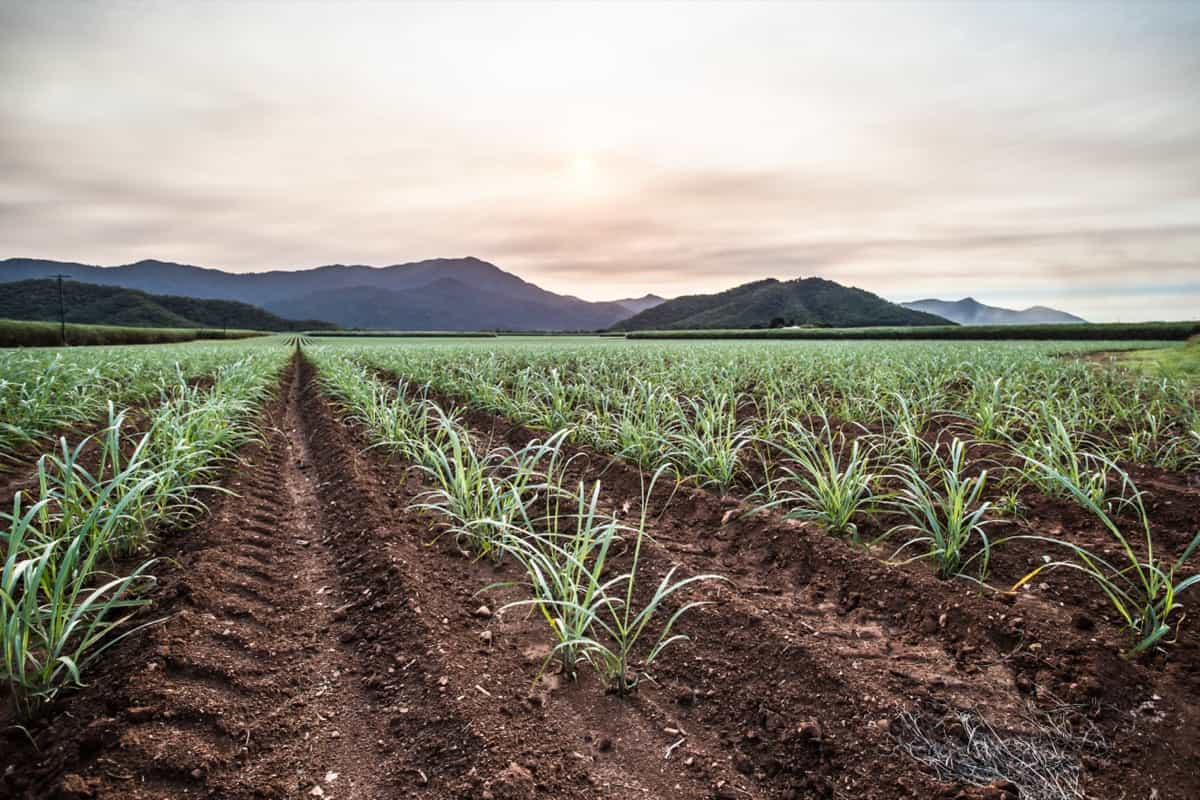
The state boasts favorable climate conditions and fertile soil ideal for cultivating this cash crop. Sugarcane production in Tamil Nadu contributes significantly to the state’s economy by providing employment opportunities and generating substantial revenue through sugar production.
Sugarcane Cultivation in Tamil Nadu
Historical Background of Sugarcane Cultivation in Tamil Nadu
Tamil Nadu has a rich history when it comes to Sugarcane cultivation. The practice of growing Sugarcane in this region dates back several centuries. It is believed that the Arab traders were responsible for introducing Sugarcane to Tamil Nadu during their expeditions along the Indian coast. The fertile soil and favorable climate of Tamil Nadu provided the perfect conditions for Sugarcane growth, leading to its widespread cultivation across the state. Today, Tamil Nadu is one of India’s major Sugarcane producers.
The historical background and long-standing tradition associated with its cultivation have played a crucial role in shaping the agricultural landscape and contributing to the state’s socio-economic fabric. With continuous advancements in research and technology, along with government support for farmers, there is no doubt that Sugarcane cultivation will continue to thrive in Tamil Nadu for years. The Sugarcane season in Tamil Nadu typically begins in October and lasts until March, coinciding with the cooler months of winter.
Climate and Soil Requirements for Sugarcane in Tamil Nadu
With its diverse agro-climatic conditions, Tamil Nadu provides a favorable environment for Sugarcane cultivation. The climate and soil requirements play a crucial role in determining the success of this crop. Sugarcane thrives in tropical and sub-tropical climates, which Tamil Nadu is blessed with. The state experiences an average temperature range of 25-35°C throughout the year, making it ideal for Sugarcane growth. Additionally, the high humidity levels during the monsoon season provide ample moisture for the crop.
In case you missed it: Best Fruit Nurseries in Tamil Nadu: Top List of Saplings Supplier for High Yield and Profits
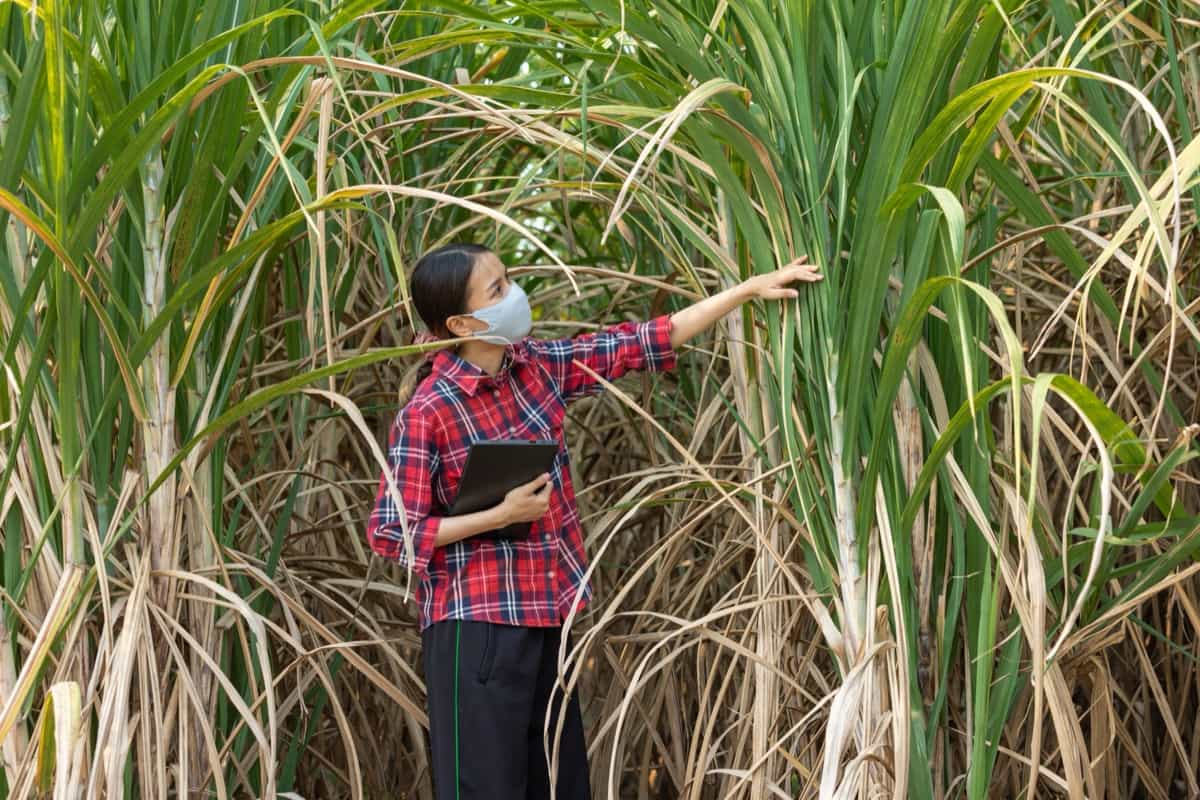
Sugarcane prefers well-drained, loamy, or clayey soils. In Tamil Nadu, black soils (regur) are widely used for cultivating Sugarcane due to their fertility and ability to retain moisture. However, other types of soils, such as red sandy loam and alluvial soils, can also be suitable if proper irrigation facilities are available. The soil’s pH level should ideally range from 6-8 for optimal plant nutrient absorption. Adequate organic matter content in the soil improves its structure and water-holding capacity.
Varieties of Sugarcane Grown in Tamil Nadu
Several Sugarcane varieties are grown in Tamil Nadu, including CO-740, CO-86032, CO-85019R (Anna Sugar), and CoC671 (Coimbatore Local). These varieties have been developed by research institutes like the Sugarcane Breeding Institute located at Coimbatore. In addition to these varieties, other commonly grown include CO 8021 and BO91-2659 (EID Parry), each with their advantages suited to specific regions or farming practices.
Land Preparation and Planting Techniques for Sugarcane in Tamil Nadu
Before planting, the land should be thoroughly plowed and leveled to ensure proper drainage and oxygenation of the soil. After leveling, farmers prepare furrows or ridges where the Sugarcane sets will be planted. These furrows allow for better water infiltration and root development. The spacing between furrows depends on various factors such as variety, soil type, and irrigation method.
Once the land is prepared, farmers select healthy Sugarcane sets called “buds” from disease-free mother plants. These buds are planted at a depth of about 5-10 cm with one eye facing upwards to promote sprouting. Proper care must be taken during planting to ensure each set is placed appropriately from its neighboring sets. This ensures optimal utilization of nutrients and resources without overcrowding.
Nutrient Management for Sugarcane in Tamil Nadu
With its high nutrient requirements, farmers must provide adequate and balanced fertilization to ensure optimal growth and yield of the crop. Farmers can determine nutrient deficiencies by analyzing the soil composition and adjusting fertilizer application. This helps prevent overuse or underuse of fertilizers, saving costs and minimizing environmental impact. In Tamil Nadu, fertilizers used for Sugarcane include urea, di-ammonium phosphate (DAP), potash, and micronutrients like zinc and boron.
In case you missed it: Greenhouse Farming in Tamil Nadu: Crops, 1 Acre Greenhouse Cost, Subsidy, and Loan
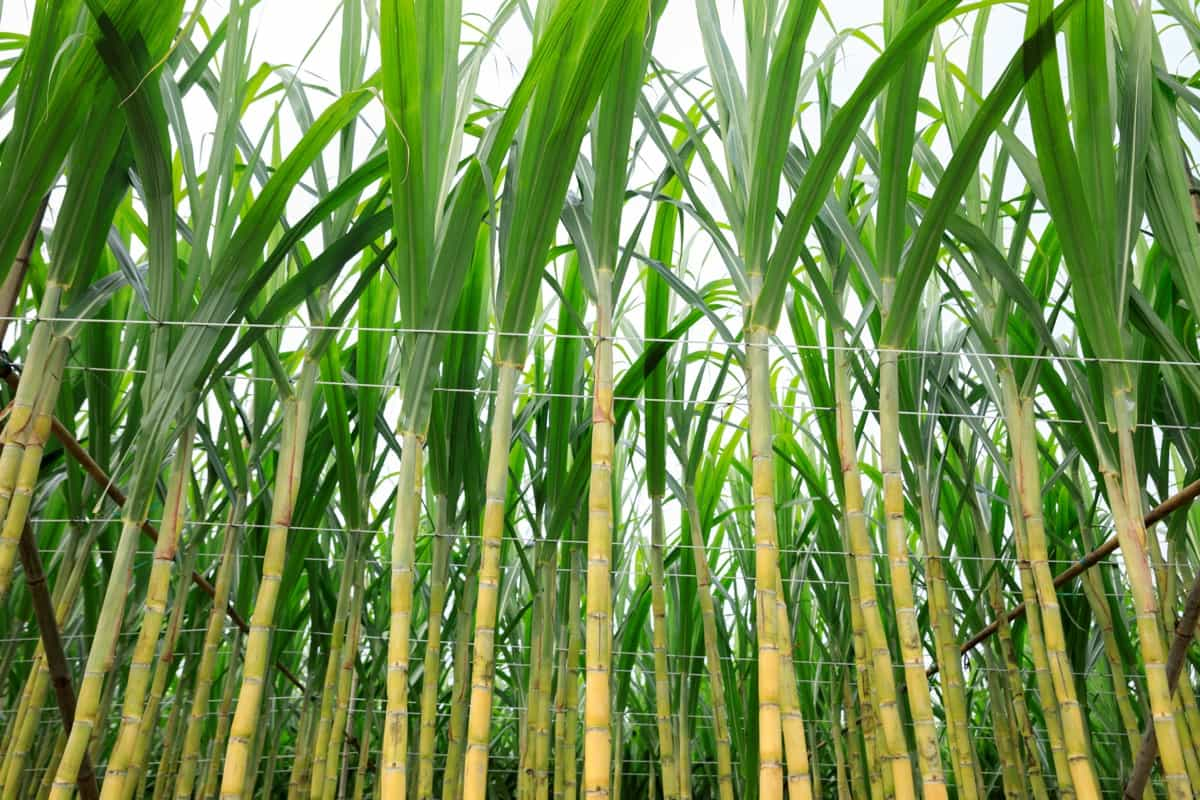
The timing of fertilizer application is also crucial; split applications are often recommended to meet the crop’s changing nutrient demands throughout its growth stages. Apart from chemical fertilizers, organic manures such as farmyard manure or compost can be incorporated into the soil to improve its fertility and enhance microbial activity. These organic inputs supply nutrients and help retain moisture in sandy soils in some parts of Tamil Nadu.
Foliar sprays containing trace elements can be utilized during critical growth stages to optimize plant nutrient uptake further. These sprays provide a quick source of nutrients directly absorbed through leaves, ensuring better utilization by Sugarcane crops. Regular monitoring of plant health through visual observations and leaf tissue analysis helps identify any deficiencies or imbalances that may arise during the growing season. Prompt corrective measures can then be taken to rectify any issues before they affect overall productivity.
Irrigation Practices for Sugarcane in Tamil Nadu
Farmers primarily rely on surface irrigation methods such as furrow or flood irrigation for Sugarcane cultivation in Tamil Nadu. These methods involve flooding the field with water through channels or furrows to ensure uniform distribution. In recent years, there has been a shift towards adopting more efficient irrigation techniques like drip and sprinkler systems.
These methods help conserve water by delivering it directly to the plant roots without waste. Drip irrigation is particularly beneficial in sandy soils prevalent in some parts of Tamil Nadu, as it minimizes water loss due to leaching. The timing and frequency of irrigation are critical factors that farmers consider while managing their Sugarcane fields.
Generally, frequent irrigations are necessary to establish healthy root systems during the initial stages after planting. As the crop matures, fewer but deep irrigations are required regularly. Water management practices such as maintaining proper drainage systems and avoiding over-irrigation significantly optimize yield potential and minimize diseases associated with excessive moisture.
Weed Management in Sugarcane Fields in Tamil Nadu
The weed management method used by Tamil Nadu farmers is manual weeding. This involves physically removing weeds from the field using hand tools or machinery. It requires labor-intensive work but can effectively reduce weed growth if done regularly and timely. Another method is chemical weed control. Herbicides are commonly used to suppress weed growth in Sugarcane fields.
In case you missed it: Growing Moringa Organically in Tamilnadu: Cultivation Practices and Production Management
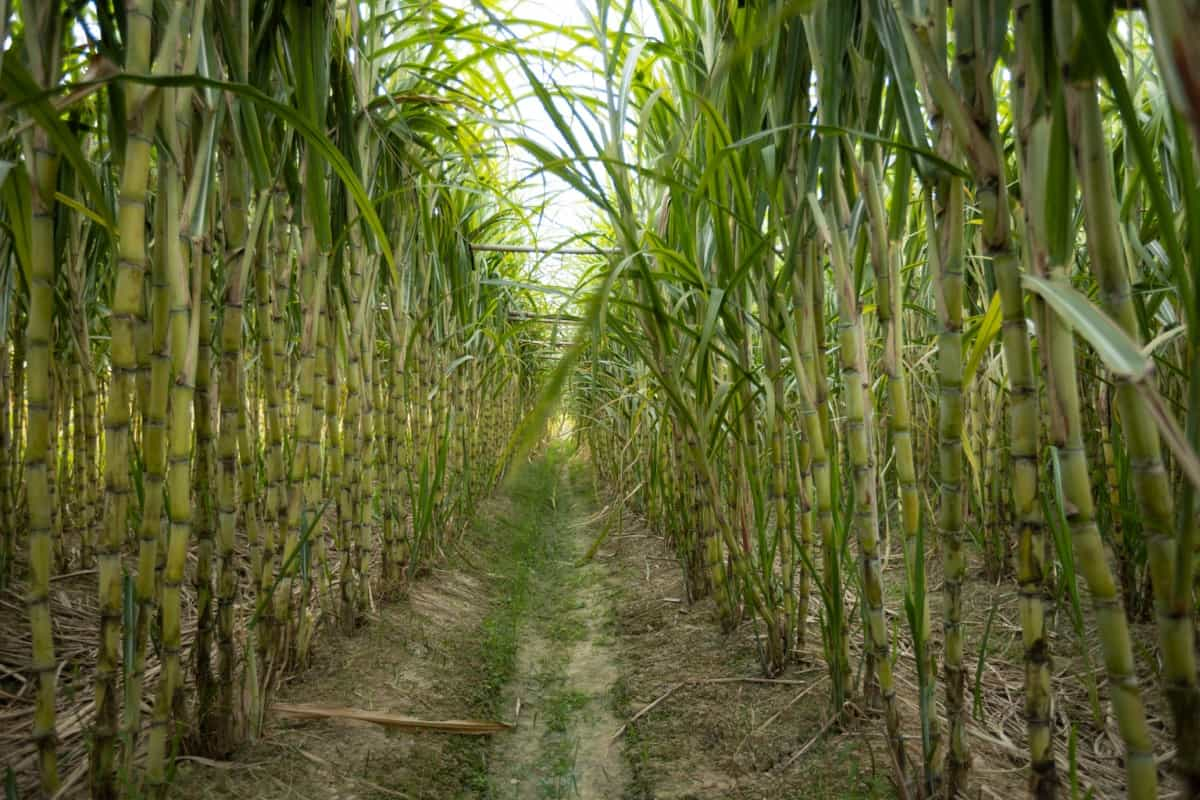
However, it is essential to use herbicides approved for Sugarcane crops and follow recommended dosage rates to avoid damage to the crop. Mulching techniques can be employed as well. Applying organic mulch around the base of Sugarcane plants helps smother weed growth while retaining soil moisture levels. Regular field monitoring is necessary throughout the growing season to identify any potential weed infestations early on so that appropriate measures can be taken promptly.
Pest and Disease Management for Sugarcane in Tamil Nadu
The common pest affecting Sugarcane in Tamil Nadu is the white grub. These voracious larvae feed on the roots, causing stunted growth and reduced cane yield. Farmers can use chemical insecticides or biological control agents such as nematodes or fungi to manage this pest. Another major pest is the Sugarcane aphid, which sucks sap from young shoots, leading to wilting and yellowing of leaves.
Farmers can employ cultural practices like intercropping with marigolds or planting resistant varieties to minimize aphid infestation. Regarding diseases, smut is a significant concern for Sugarcane growers in Tamil Nadu. This fungal infection causes black whip-like structures on emerging shoots, affecting yield and sugar content.
Crop rotation, seed treatment with fungicides, and removal of infected plants are some methods used to manage smut. Other diseases for Sugarcane farming in Tamil Nadu include red rot, ratoon stunting disease (RSD), leaf scald, etc., each requiring specific management practices like using disease-free seeds or resistant varieties combined with proper sanitation measures.
District-wise Sugarcane Production in Tamil Nadu
In the Coimbatore district, farmers have embraced modern cultivation techniques and innovative farming practices to achieve high yields. The fertile soil and abundant rainfall make this region ideal for Sugarcane cultivation. Vellore district has emerged as another key player in Sugarcane farming. With well-irrigated fields and efficient water management strategies, farmers can maximize their crop yield.
Additionally, Thanjavur district stands out for its traditional methods of Sugarcane cultivation passed down through generations. Erode district has gradually emerged as a prominent Sugarcane-growing region too. Farmers here have adopted modern techniques and improved varieties to enhance their yield.
In case you missed it: Top Agriculture Colleges in Tamil Nadu: Government and Private
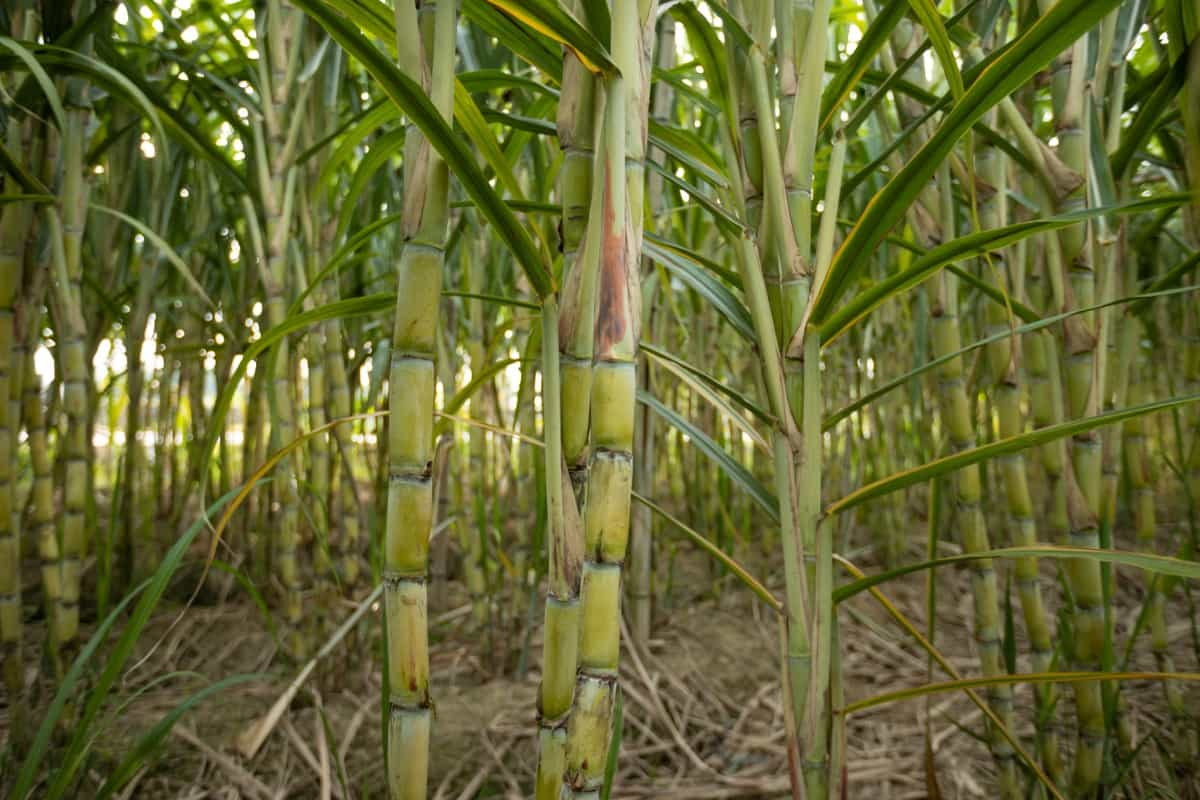
Trichy is another key player in Sugarcane production within Tamil Nadu. Its strategic location along the banks of river Kaveri provides abundant water supply for irrigation purposes. Other notable districts contributing to Tamil Nadu’s sugar industry include Madurai, Tiruchirappalli, Salem, and Erode. These regions have consistently progressed by adopting advanced farming techniques and improved irrigation systems.
Harvesting and Post-Harvest Management of Sugarcane in Tamil Nadu
Harvesting is a crucial step in Sugarcane production management in Tamil Nadu as it determines the quality and quantity of yield. In Tamil Nadu, harvesting usually occurs after 11 to 12 months of planting when the crop reaches its maturity stage. The first sign of readiness for harvest is the change in color of the lower leaves from green to yellow.
During harvesting, laborers use sharp knives or machetes to cut the canes close to the ground. It’s important to ensure that only mature canes are harvested, as immature ones may affect sugar recovery during processing. Once harvested, the canes are bundled into manageable sizes and transported using bullock carts or tractors.
After harvesting, post-harvest management in Sugarcane is crucial in preserving cane quality until it reaches the sugar mills for processing. This includes properly cleaning and removing leaf trash before loading onto transport vehicles. Additionally, timely transportation is essential to avoid any deterioration in cane quality due to exposure or delays.
Sugar Production and Processing in Tamil Nadu
The Sugarcane grown here holds immense potential for processing into various forms of sugar, from crystal sugar to jaggery. Once the Sugarcane is harvested, it undergoes a series of processes to extract the sweet juice, eventually turning it into sugar. The first step involves crushing the cane using heavy machinery to release the juice. This juice is then filtered and clarified to remove any impurities.
Next, the clear juice evaporates, where water content is reduced by boiling it. This concentrated syrup is then crystallized and processed to obtain raw or refined sugar. Sometimes, this syrup can also produce jaggery or other traditional sweeteners. The final product undergoes quality control measures before being packaged and distributed across India.
It’s worth noting that modern technology has greatly enhanced the efficiency of these processes, ensuring high-quality sugars are produced with minimal wastage. Moreover, besides meeting domestic demand, Tamil Nadu also exports significant quantities of sugar. This contributes to economic growth and helps establish Tamil Nadu as a key player in the global market.
Government Policies and Support for Sugarcane Farmers in Tamil Nadu
The government of Tamil Nadu recognizes the importance of Sugarcane farming and has implemented several policies to support and uplift the farmers in this sector. One such policy is the Minimum Support Price (MSP) scheme, which ensures farmers receive a fair price for their produce.
In addition to MSP, the government provides subsidies on inputs like fertilizers, seeds, and irrigation equipment. This helps reduce the cost burden on farmers and encourages them to adopt modern agricultural practices. The government offers financial assistance programs such as low-interest loans to support Sugarcane farmers further. These loans can be utilized for different purposes, like purchasing machinery or investing in infrastructure development.
Moreover, the government has established research institutes and agricultural universities to provide technical guidance and training to Sugarcane farmers. Furthermore, the government actively promotes organic farming practices by incentivizing sustainable methods. This benefits the environment, enhances soil fertility, and reduces input costs for farmers.
Cultivation Cost and Profit Analysis of Sugarcane in Tamil Nadu
The overall cost of cultivating Sugarcane in Tamil Nadu is approximately Rs 70,000 to Rs 87,500 per hectare. This includes various expenses like land preparation, seedling procurement, irrigation systems, fertilizers, pesticides, labor wages, and machinery. In addition to the total Sugarcane cultivation cost per hectare, it’s also important to consider the cost of production. The Sugarcane production cost in Tamil Nadu is around Rs 105.70 per quintal of Sugarcane harvested.
In case you missed it: Poultry Farming in Tamil Nadu, How to Start, Schemes, Loans, and Subsidy

Sugarcane Yield in Tamil Nadu
The average Sugarcane yield in Tamil Nadu is approximately 800 to 830 quintals per hectare. Achieving such yields requires proper management practices throughout the crop cycle, including timely planting, appropriate nutrient application based on soil testing results, efficient irrigation techniques, and pest control measures.
Crop Profile for Sugarcane in Tamil Nadu
| Steps for Sugarcane Cultivation | Description |
| Identify suitable land | Selecting the land with fertile soil and proper drainage |
| Prepare the land | Clear the field of any weeds or debris. |
| Choose appropriate varieties | |
| Planting technique | The trench method or sett method should be followed based on local conditions. |
| Nutrient management | Provide nutrients through organic manure or chemical fertilizers. |
| Irrigation practices | Drip irrigation or furrow irrigation must be adopted. |
| Weed management | Manual weeding or herbicide application to prevent weed competition |
| Pest and disease management | Monitor crops regularly, using appropriate pesticides. |
| Harvesting and post-harvest management | Harvest mature cane stalks manually using sharp knives. |
Conclusion
Sugarcane farming holds significant importance in the agricultural landscape of Tamil Nadu. This cash crop has been cultivated for centuries and contributes to the state’s economy. Many small-scale farmers rely on Sugarcane cultivation as their main livelihood, providing much-needed financial stability. Moreover, Sugarcane farming in Tamil Nadu also plays a crucial role in employment generation. The entire process, from planting to harvesting and processing, requires a considerable workforce.
- Types of Pesticides Used in Agriculture: A Beginner’s Guide
- Economical Aquaculture: A Guide to Low-Budget Fish Farming
- 15 Common Planting Errors That Can Doom Your Fruit Trees
- How to Make Houseplants Bushy: Effective Tips and Ideas
- Innovative Strategies for Boosting Coconut Pollination and Yield
- Pollination Strategies for Maximum Pumpkin Yield
- The Complete Guide to Chicken Fattening: Strategies for Maximum Growth
- Natural Solutions for Tulip Problems: 100% Effective Remedies for Leaf and Bulb-Related Issues
- Revolutionizing Citrus Preservation: Towards a Healthier, Greener Future
- Natural Solutions for Peony Leaf and Flower Problems: 100% Effective Remedies
- Maximizing Profits with Avocado Contract Farming in India: A Comprehensive Guide
- Natural Solutions for Hydrangea Problems: 100% Effective Remedies for Leaf and Flowers
- The Ultimate Guide to Choosing the Perfect Foliage Friend: Bringing Life Indoors
- From Sunlight to Sustainability: 15 Ways to Use Solar Technology in Agriculture
- The Ultimate Guide to Dong Tao Chicken: Exploring from History to Raising
- The Eco-Friendly Makeover: How to Convert Your Unused Swimming Pool into a Fish Pond
- Mastering the Art of Delaware Chicken Farming: Essentials for Healthy Backyard Flocks
- 20 Best Homemade Fertilizers for Money Plant: DIY Recipes and Application Methods
- How to Craft a Comprehensive Free-Range Chicken Farming Business Plan
- Brighten Your Flock: Raising Easter Egger Chickens for Beauty and Bounty
- How to Optimize Your Poultry Egg Farm Business Plan with These Strategies
- Subsidy for Spirulina Cultivation: How Indian Government Schemes Encouraging Spirulina Farmers
- Ultimate Guide to Raising Dominique Chickens: Breeding, Feeding, Egg-Production, and Care
- Mastering the Art of Raising Jersey Giant Chickens: Care, Feeding, and More
- Ultimate Guide to Raising Legbar Chickens: Breeding, Farming Practices, Diet, Egg-Production
- How to Raise Welsummer Chickens: A Comprehensive Guide for Beginners
- How to Protect Indoor Plants in Winter: A Comprehensive Guide
- Ultimate Guide to Grow Bag Gardening: Tips, Tricks, and Planting Ideas for Urban Gardeners
- Guide to Lotus Cultivation: How to Propagate, Plant, Grow, Care, Cost, and Profit
- Agriculture Drone Subsidy Scheme: Government Kisan Subsidy, License, and How to Apply Online
- Ultimate Guide to Raising Araucana Chickens: Breed Profile, Farming Economics, Diet, and Care
- Bringing Hydroponics to Classroom: Importance, Benefits of Learning for School Students
- Ultimate Guide to Raising Polish Chickens: Breed Profile, Farming Economics, Diet, and Care
- Ultimate Guide to Raising Australorp Chickens: Profile, Farming Economics, Egg Production, Diet, and Care
- Silkie Chicken Farming: Raising Practices, Varieties, Egg Production, Diet, and Care
- Sussex Chicken Farming: Raising Practices, Varieties, Egg Production, Diet and Care